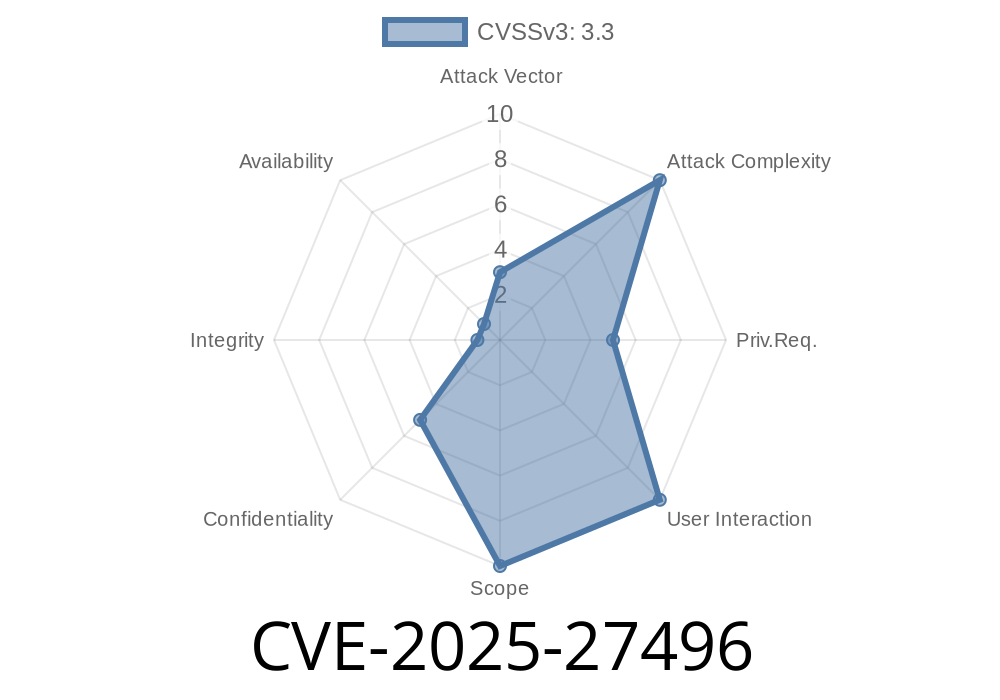Snowflake’s cloud data platform is widely used for artificial intelligence workloads and large-scale data processing. But even the biggest platforms can have unexpected security slips. In this long read, we cover CVE-2025-27496—a recently discovered vulnerability in the Snowflake JDBC driver that could accidentally expose sensitive encryption material on client machines, especially when debugging is enabled.
If you use Snowflake in your organization or rely on the JDBC driver, keep reading to understand the risk, see a code example, and learn how to stay safe.
What is CVE-2025-27496?
CVE-2025-27496 describes a vulnerability in the Snowflake JDBC driver—the Java library that lets applications connect to a Snowflake data warehouse using JDBC. A bad logging practice in some driver versions meant that when you set logging to DEBUG, the driver dumped the *client-side encryption master key* into local logs during some file transfer operations.
Versions affected:
Snowflake JDBC Driver 3..13 through 3.23.
Fixed in:
- 3.23.1 Release Notes
While the key logged isn't alone enough to retrieve or unlock data, logging *any* sensitive material can help attackers during a wider compromise or investigation, especially if your logs are sent to centralized or cloud log systems.
The Context: Logging in DEBUG Mode
When the JDBC driver operates at DEBUG logging level, it records a lot of internal info to help developers debug issues. In the affected versions, during a GET or PUT operation involving encrypted data (typically used for transferring data to/from stages), the driver logs the *client-side encryption master key*.
Important:
Code Example: How the Key Appeared in Logs
Here’s a simplified example like what you might see in your log when running affected driver versions with DEBUG log level enabled:
// Example log line produced by the vulnerable driver
logger.debug(
"Stage master key for file encryption: {}",
base64Encode(encryptionMasterKey)
);
Actual log output (with fake key)
DEBUG com.snowflake.client.jdbc.SnowflakeFileTransferAgent: Stage master key for file encryption: QWxhZGRpbjpvcGVuIHNlc2FtZQ==
If your logs are rotated to a file or logged to a centralized cloud logging system, then anyone with access to those logs could access the master key just by searching for relevant entries.
Gain access to DEBUG logs
- This can be on the local host, on a developer laptop, or a central logging server (e.g., Splunk, AWS CloudWatch).
Attempt to use the key
- While the key alone doesn't grant direct data access, it could be paired with other leaks or misconfigurations for deeper exploitation later.
The vulnerability does NOT allow an attacker to read data from Snowflake by itself.
- The leak is NOT exploited remotely via the database connection—it’s a local/log issue.
1. Upgrade Your JDBC Driver
Upgrade to at least version 3.23.1 (or newer).
Release Notes:
https://docs.snowflake.com/en/user-guide/jdbc-driver#release-notes
You can typically update with
<!-- Maven example -->
<dependency>
<groupId>net.snowflake</groupId>
<artifactId>snowflake-jdbc</artifactId>
<version>3.23.1</version>
</dependency>
Or, for Gradle
implementation 'net.snowflake:snowflake-jdbc:3.23.1'
Run in INFO level in production, not DEBUG, unless debugging.
- Secure audit/log files: limit access only to trusted users/services.
More Reading & References
- Snowflake JDBC Driver Documentation
- CVE-2025-27496 at NVD (National Vulnerability Database) *(if published)*
- Snowflake Release Notes
Conclusion
CVE-2025-27496 highlights how even trusted infrastructure can have gaps through something as simple as logging overly sensitive info in debugging scenarios. If you use the Snowflake JDBC driver, upgrade ASAP, check your log settings, and prune any leaked keys just in case.
Always remember: turning on DEBUG isn’t harmless in production—know what you’re logging!
Timeline
Published on: 03/13/2025 19:15:52 UTC
